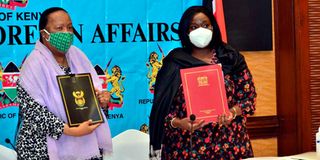Kenya, S. Africa to formalise pacts on tourism, defence, migration

Foreign Affairs CS Raychelle Omamo (right) and South African Minister for International Relations and Cooperation Naledi Pandor during the signing of an MoU at the Serena Hotel on August 11, 2021.
Kenya and South Africa on Wednesday vowed to finalise pending agreements between them, which they say will strengthen their ties.
Traditionally trading partners, officials from both sides claim the ties are somewhat satisfactory but they admitted they must now formalise agreements on tourism, defence, migration.
Both countries welcomed negotiations of agreements and memoranda of understanding under the areas of correctional services, political consultations, migration, tourism, return of nationals refused entry and illegal entrants and diplomatic training.
The details came out of an inaugural Joint Commission on Cooperation (JCC) in Nairobi by delegations from both countries.
Kenya's Foreign Affairs Cabinet Secretary Raychelle Omamo and visiting South African counterpart Naledi Pandor led the session after which they committed to addressing all impediments that hinder bilateral cooperation between the two countries.
"These areas include trade and investment, agriculture, livestock and fisheries, education and human resource development, arts, culture and sports, defence and police matters, health, science and technology, energy, maritime and air transport, housing and human settlement and infrastructure development within the Lamu port-South Sudan, Ethiopia (Lapsset) Corridor," CS Omamo said while reading a joint communique.
Uhuru state visit
In a bid to further deepen the two countries relations, President Uhuru Kenyatta will in November make a state visit to South Africa at the invitation of President Cyril Ramaphosa.
Earlier, the two ministers held a virtual meeting with President Kenyatta in which he proposed a commercial partnership between Kenya Airways and South African Airways.
“Our two countries occupy strategic positions in their respective regions. Therefore, our cooperation is not only useful to our countries but also to our respective regions. I believe our cooperation is also essential for our continent,” he said.
South Africa's formal objection to the AU decision to grant Israel an observer status was not part of the deliberations, Minister Pandor disclosed.
"I did not lobby minister Omamo or indeed His Excellency President Kenyatta, whom I had the privilege of enjoying a conversation with virtually earlier today, because I believe each country in the African Union knows the position of the Palestinian people and the role of Israel with respect to denial of statehood and self-determination to the people of Israel.
"I think it is a matter of conscience, it is not a matter of lobbying. We are very clear that any country that practices imperialism and colonialism cannot be seen as a country that the African Union should grant friendly status to. This is the position we hold as South Africa," the minister said.
South Africa’s objection
The government of South Africa officially wrote to the AU last month indicating its objection to the decision on grounds that as long as Israel is not willing to negotiate a peace plan without preconditions, it should not be granted an observer status in the African Union.
"The African Union cannot be a party in any way to plans and actions that would see the ideal of Palestinian statehood reduced into balkanised entities devoid of true sovereignty without territorial contiguity and with no economic viability," the government announced in a statement.
Kenya is opting to wait for the outcome of the AU executive council's discussion on the matter.
"Matters of this nature ought to be discussed at the AU level. This matter will be tabled before the executive council so that it can be discussed in depth and that a consensus can be built around the decisions that have been made so far by the AU," said CS Omamo.





